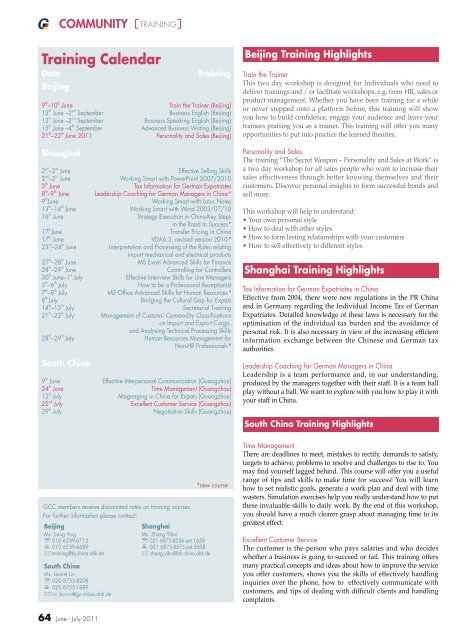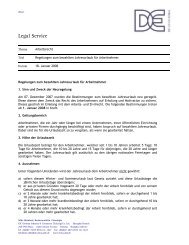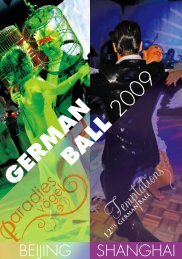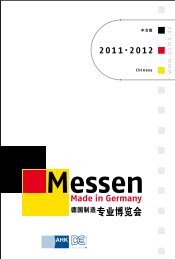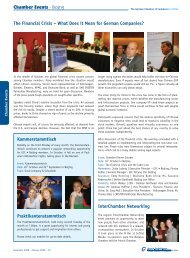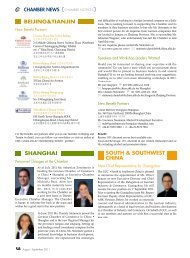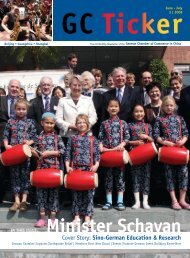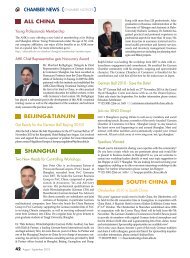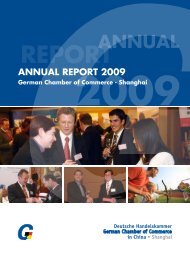Training Calendar - AHK
Training Calendar - AHK
Training Calendar - AHK
Create successful ePaper yourself
Turn your PDF publications into a flip-book with our unique Google optimized e-Paper software.
COMMUNITY<br />
<strong>Training</strong> <strong>Calendar</strong><br />
64 June - July 2011<br />
Beijing <strong>Training</strong> Highlights<br />
Date <strong>Training</strong> Train the Trainer<br />
Beijing<br />
This two day workshop is designed for Individuals who need to<br />
deliver trainings and / or facilitate workshops, e.g. from HR, sales or<br />
9<br />
product management. Whether you have been training for a while<br />
or never stepped onto a platform before, this training will show<br />
you how to build confidence, engage your audience and leave your<br />
trainees praising you as a trainer. This training will offer you many<br />
opportunities to put into practice the learned theories.<br />
th –10 th June Train the Trainer (Beijing)<br />
13 th June –2 nd September Business English (Beijing)<br />
13 th June –2 nd September Business Speaking English (Beijing)<br />
15 th June –4 th September Advanced Business Writing (Beijing)<br />
21 th –22 th June 2011 Personality and Sales (Beijing)<br />
Shanghai<br />
2 nd –3 rd June Effective Selling Skills<br />
2 nd –3 rd June Working Smart with PowerPoint 2007/2010<br />
3 th June Tax Information for German Expatriates<br />
8 th –9 th June Leadership Coaching for German Managers in China*<br />
9 th June Working Smart with Lotus Notes<br />
13 th –14 th June Working Smart with Word 2003/07/10<br />
16 th June Strategy Execution in China-Key Steps<br />
in the Road to Success*<br />
17 th June Transfer Pricing in China<br />
17 th June VDA6.3, revised version 2010*<br />
23 rd –24 th June Interpretation and Processing of the Rules relating<br />
import mechanical and electrical products<br />
27 th –28 th June MS Excel Advanced Skills for Finance<br />
28 th –29 th June Controlling for Controllers<br />
30 th June–1 st July Effective Interview Skills for Line Managers<br />
5 th –6 th July How to be a Professional Receptionist<br />
7 th –8 th July MS Office Advanced Skills for Human Resources*<br />
8 th July Bridging the Cultural Gap for Expats<br />
14 th –15 th July Secretarial <strong>Training</strong><br />
21 th –22 th July Management of Customs’ Commodity Classifications<br />
on Import and Export Cargo,<br />
and Analysing Technical Processing Skills<br />
28 th –29 th July Human Resources Management for<br />
Non-HR Professionals*<br />
South China<br />
GCC members receive discounted rates on training courses.<br />
For further information please contact:<br />
Beijing<br />
Ms. Jiang Ying<br />
' 010 6539-6712<br />
6 010 6539-6689<br />
* training@bj.china.ahk.de<br />
South China<br />
Ms. Leonie Lin<br />
' 020 8755-8208<br />
6 020 8755-1889<br />
* lin.leonie@gz.china.ahk.de<br />
TRAINING<br />
9 th June Effective Interpersonal Communication (Guangzhou)<br />
24 th June Time Management (Guangzhou)<br />
12 th July Magnaging in China for Expats (Guangzhou)<br />
22 nd July Excellent Customer Service (Guangzhou)<br />
29 th July Negotiation Skills (Guangzhou)<br />
*new course<br />
Shanghai<br />
Ms. Zhang Yihui<br />
' 021 6875-8536 ext.1658<br />
6 021 6875-8573 ext.5658<br />
* zhang.yihui@sh.china.ahk.de<br />
Personality and Sales<br />
The training “The Secret Weapon – Personality and Sales at Work” is<br />
a two day workshop for all sales people who want to increase their<br />
sales effectiveness through better knowing themselves and their<br />
customers. Discover personal insights to form successful bonds and<br />
sell more.<br />
This workshop will help to understand:<br />
• Your own personal style<br />
• How to deal with other styles<br />
• How to form lasting relationships with your customers<br />
• How to sell effectively to different styles<br />
Shanghai <strong>Training</strong> Highlights<br />
Tax Information for German Expatriates in China<br />
Effective from 2004, there were new regulations in the PR China<br />
and in Germany regarding the Individual Income Tax of German<br />
Expatriates. Detailed knowledge of these laws is necessary for the<br />
optimisation of the individual tax burden and the avoidance of<br />
personal risk. It is also necessary in view of the increasing efficient<br />
information exchange between the Chinese and German tax<br />
authorities.<br />
Leadership Coaching for German Managers in China<br />
Leadership is a team performance and, in our understanding,<br />
produced by the managers together with their staff. It is a team ball<br />
play without a ball. We want to explore with you how to play it with<br />
your staff in China.<br />
South China <strong>Training</strong> Highlights<br />
Time Management<br />
There are deadlines to meet, mistakes to rectify, demands to satisfy,<br />
targets to achieve, problems to resolve and challenges to rise to. You<br />
may find yourself lagged behind. This course will offer you a useful<br />
range of tips and skills to make time for success! You will learn<br />
how to set realistic goals, generate a work plan and deal with time<br />
wasters. Simulation exercises help you really understand how to put<br />
these invaluable skills to daily work. By the end of this workshop,<br />
you should have a much clearer grasp about managing time to its<br />
greatest effect.<br />
Excellent Customer Service<br />
The customer is the person who pays salaries and who decides<br />
whether a business is going to succeed or fail. This training offers<br />
many practical concepts and ideas about how to improve the service<br />
you offer customers, shows you the skills of effectively handling<br />
inquiries over the phone, how to effectively communicate with<br />
customers, and tips of dealing with difficult clients and handling<br />
complaints.
www.china.ahk.de<br />
Caught in between Cultures<br />
Intercultural Competency Key to<br />
Global Talent Management Strategy<br />
For global companies working across multiple boundaries and<br />
sourcing talent from across the world, intercultural competency is an<br />
increasingly strategic aspect of talent development. Past iterations of<br />
the talent management cycle have been more one-directional (often<br />
involving expatriate assignments from West to East), and the scope of<br />
intercultural training was often limited to preparing a foreign manager<br />
to work well with his or her team of local subordinates. Today, the path<br />
for developing global talent is fluid, multidimensional and increasingly<br />
complex. A Chinese managing director for a German firm can be based<br />
in Bangkok with regional responsibilities for the Asian Pacific Region<br />
(APAC) while simultaneously leading a functional team based in<br />
Denmark. Virtual, matrixed corporate structures require a high level<br />
of intercultural competence at every level of the organization. As a<br />
result, intercultural training now plays a role – and has the potential<br />
to impact a company’s success – at every stage of the global talent<br />
management cycle.<br />
Using the example<br />
of the Chinese<br />
managing director<br />
in Bangkok, an<br />
intercultural training<br />
that addresses key<br />
regional differences<br />
in motivation and<br />
decision-making<br />
can ensure that<br />
the Chinese MD<br />
successfully engages and rewards talent within APAC. <strong>Training</strong> or<br />
coaching that develops the MD’s awareness and skills for remotely<br />
leading team members in a more direct, egalitarian environment, will<br />
help him to create a high-performing functional team with his Danish<br />
counterparts. Setting up this Chinese leader for success in both roles<br />
can, in turn, create a visible development path for other Chinese high<br />
potentials and raise the German firm’s standing as employer of choice<br />
in China, with the resulting benefit of increased talent retention in the<br />
Chinese market (no small feat).<br />
The most important element of a high-impact intercultural training is<br />
that the skills being developed are applicable to the participant and<br />
corporate needs. Intercultural training should be highly practical and<br />
relevant, providing much more than a list of protocol do’s and dont’s<br />
which are easily forgotten and provide little insight into the real<br />
underlying intercultural issues, such as “what are the expectations for<br />
leadership in China?”. In a specific case involving a German director<br />
recently assigned to lead a team of highly-qualified Chinese engineers,<br />
the needs go well beyond business card exchange protocol. An indepth<br />
needs analysis identifies the key areas for the individual’s<br />
development in a global leadership capacity.<br />
In Germany, the director was trained to show respect to well-qualified<br />
staff by leading with a ‘hands-off’ style. He provides a concise<br />
explanation of the project, process and deadlines and then closes his<br />
door and allows his employees to manage their time and tasks without<br />
disturbing their autonomy. If his subordinates have any problems or<br />
EDuCATION<br />
questions, he expects that they will come to him directly and ask for<br />
clarification or suggest process improvements. He does not meddle<br />
in his staff’s personal issues and maintains strict professionalism. In<br />
Germany, this style established his success and credibility. In China,<br />
this leadership style is causing problems. The director is running into<br />
major quality issues, and the team does not seem to understand the<br />
process. His team does not approach him with questions or process<br />
improvements but then misses deadlines or blames quality failures<br />
on a delayed supplier. The German director addresses this with<br />
immediate direct feedback, clearly pointing out the specific failures of<br />
individuals on the team in the hopes that they will take responsibility<br />
and make improvements in the next cycle. The team is struggling with<br />
retention issues, and this represents a major risk to the company’s<br />
intellectual property as well as a huge investment loss.<br />
The intercultural consulting solution focuses on raising awareness<br />
about the director’s leadership style and questioning culturally-held<br />
assumptions around empowerment, autonomy and professionalism.<br />
The key cultural differences impacting the director’s success are<br />
presented and explained. In this case, a few examples might be:<br />
n Chinese learning style preferences include modelling and very<br />
“hands-on” leadership engagement, frequent follow-ups, project<br />
check-ins and forums for informal conversations and questions. The<br />
director assumes that he is showing respect for his team’s autonomy<br />
and privacy by maintaining distance, but this is perceived very<br />
negatively. His compartmentalised style, including his focus on tasks<br />
rather than relationship building, is creating an environment where<br />
he is cut off from key information and perceived to be neglecting his<br />
responsibilities to the team.<br />
n Chinese communication style is much less direct than the typical<br />
German style. The team may be communicating through their missed<br />
deadlines that they do not have the information or support they need<br />
to complete the task. However, to communicate this directly would<br />
be perceived as criticism of the director’s leadership. In China, it<br />
is the leader’s responsibility to ensure that the team knows how to<br />
execute a project and poor results reflect badly on the leader rather<br />
than on the team. The director’s public feedback style is also causing<br />
team members to lose face and may lead to resentment, especially if<br />
ultimate responsibility for mistakes lies with him.<br />
The director’s degree of success in this global leadership role stands to<br />
have an immense impact on the company’s future in a crucial market.<br />
With so much at stake, it is essential that companies take a systemic<br />
approach to developing global talent and address intercultural<br />
competence at every stage of the global talent management process.<br />
Ms. Christie Caldwell is a Senior Consultant and Manager of<br />
IP Research and Development at Aperian Global. Aperian Global<br />
is a global talent development firm providing holistic solutions to<br />
support our clients’ globalisation needs.<br />
' +44 117 942-7924 | * ccaldwell@aperianglobal.com<br />
www.aperianglobal.com<br />
2011 June - July 65
Shanghai is a city where the seasons change<br />
quickly. After a long and cold winter,<br />
there is only a short spring before the high<br />
temperatures of the summer season start.<br />
Shanghai summers are a challenge for our<br />
health. With hot temperatures and high<br />
degrees of humidity outside and cold ACconditioning<br />
inside, many people cannot<br />
avoid suffering from an illness that is<br />
associated with these extreme conditions.<br />
According to TCM, high temperatures<br />
promote heat-related illnesses. The obvious<br />
illnesses are dehydration, heat cramps and<br />
heat exhaustion or even heat stroke. But<br />
also other heat-related diseases like high<br />
blood pressure, cholesterol, migraine or<br />
menopause symptoms often worsen in<br />
summer time.<br />
Especially children (but also adults) often<br />
suffer from summer heat when they<br />
experience loss of fluids and salt through<br />
heavy sweating. Heat illnesses usually start<br />
with the symptoms of dehydration. Kids<br />
might face the same symptoms as adults,<br />
e.g. they are overly thirsty, have little and<br />
dark yellow urine, are tired and complain<br />
about headaches. A cool place and enough<br />
water or unsweetened tea will improve the<br />
kids’ or adults’ situation fast. When doing<br />
exercise in warm weather, kids and adults<br />
alike can be afflicted with heat cramps.<br />
Heat cramps are heavy muscle pain or<br />
muscle spasms during or after exercising in<br />
the heat. It is recommended to stop doing<br />
sports directly, go into the shade and drink<br />
several cups of water or sports drinks. Also,<br />
HEALTH<br />
Living Healthy<br />
in Summer Time<br />
light stretching and massage will help. In<br />
general, doing sports outside by over 28°C<br />
can be dangerous to the body. Intensive loss<br />
of fluids and heat exposure can lead to heat<br />
exhaustion and heat stroke. Symptoms are<br />
pale skin, fast breathing, headaches, nausea,<br />
fainting, and vomiting. A doctor should<br />
be consulted instantly. In the meantime,<br />
cooling down the body with fans or cold<br />
towels is helpful. When the person is not<br />
vomiting and does not feel nauseous, cool<br />
drinks can be given as well. In general,<br />
following some advice can hamper heatrelated<br />
illnesses easily. Drinking a lot of<br />
water (although avoiding ice-cold drinks)<br />
and resting sufficiently is essential. When<br />
being outdoors, reduce the time of working<br />
or exercising and avoid direct exposure to<br />
sunlight. The body can already be cooled<br />
down by the right clothes: loose-fitting, light<br />
colors and light weight.<br />
In summer time, not only the heat makes<br />
us suffer a lot but also the humid weather.<br />
When humidity attacks the body, it often<br />
leads to dampness in the spleen-organ and<br />
results in stomach and digestion diseases.<br />
Common symptoms are nausea, diarrhea,<br />
constipation, and loss of appetite. To relieve<br />
the dampness and the heat from the body,<br />
eating the right foods usually helps a lot.<br />
Particularly in summer, greasy and fried<br />
foods, spicy foods, alcohol, sweets and milk<br />
products lead to dampness in the digestion<br />
system. Also, cold beverages, fermented<br />
foods and vinegar compound the symptoms.<br />
Good food items are onions, basil, rosemary,<br />
dill, oregano and parsley as they clear the<br />
www.china.ahk.de<br />
heat and the dampness from the body.<br />
Carefully selecting the right combination of<br />
foods for the daily diet can prevent stomach<br />
illnesses and strengthen the digestive system<br />
right from the beginning. By looking at<br />
the local traditions, the Chinese change<br />
the nutrition according to the seasons. In<br />
summer, their diet consists of lightly cooked<br />
or lightly fried foods. The Chinese eat more<br />
summer fruits, fish, salads (pasta or rice)<br />
and a lot of vegetables. Preferred veggies<br />
are white mushrooms, tomatoes, spinach,<br />
carrots, asparagus, broccoli, bamboo,<br />
lemon, soybeans, and eggplant. Highly<br />
recommended in summer are watermelon,<br />
cucumber and strawberry as these foods<br />
clear heat and generate fluids. These<br />
items also strengthen the digestion, have<br />
anti-inflammatory properties and reduce<br />
swellings. A very popular Chinese summer<br />
dish with a cooling effect on the body is<br />
mung bean soup which can be served cold<br />
or warm. Other cooling vegetable soups are<br />
also healthy and delicious in summer time.<br />
Summer is a great season of joy and<br />
happiness, in Chinese medicine it is the<br />
season of the heart. It is a time for our bodies<br />
to nourish, collect power and spirit. Enjoy<br />
this special season in a healthy way together<br />
with your families and friends.<br />
Ms. Doris Rathgeber,General<br />
Manager of Body & Soul Medical Clinics<br />
For more information go to:<br />
www.tcm-shanghai.com<br />
2011 June - July 67
COMMUNITY<br />
German -<br />
Chinese Hip<br />
Hop promotes<br />
intercultural<br />
collaboration<br />
Hip Hop in Germany<br />
At that time Hip Hop quickly transformed<br />
into an important part in the lives of German<br />
youngsters. Based on that Mr. Akim Walta<br />
founded the project “Hip Hop Stützpunkt”<br />
in Berlin back in 2007. It’s a privately<br />
financed cultural institution with an urban<br />
culture focus and located at the Prenzlaur<br />
Berg in Berlin. The project is well known<br />
in the scene for its grass roots Hip Hop<br />
and urban art activism and interventions.<br />
Housed in an old transformer station<br />
built in 1929, the “Hip Hop Stützpunkt”<br />
was renovated in 2007 with the help of 40<br />
young members of the Hip Hop and graffiti<br />
community. It serves as the headquarters for<br />
the global Hip Hop and urban art network<br />
FROM HERE TO FAME. Under the FHTF<br />
umbrella exists On The Run Markers, From<br />
Here To Fame Publishing and MZEE Records<br />
among others. FHTF has a long history of<br />
involvement in the development of urban<br />
culture in Europe dating back to the early<br />
68 June - July 2011<br />
ART AND CuLTuRE<br />
Dancing C<br />
When it comes to sharing a passion cultural differences can easily be overcome.<br />
Urban art and Hip Hop are just two examples that show how boundaries between<br />
different classes and cultures can be broken and common things be revealed. Started<br />
as a neighbourhood activity in New York’s South Bronx back in the 70s it is now an<br />
international culture, and a prime example of intercultural migration. Background, skin<br />
color and language are irrelevant. In Hip Hop, what matters is what skills you have.<br />
Since any young Hip hop scene deals in the beginning with the same. Breaking, graffiti,<br />
rhyming or the manipulation of the turntable all belong to Hip Hop and are a creative<br />
way young people express themselves. In the early 80s then other elements of Hip Hop<br />
- like dance, music and art - were transported as a cultural package trough the media<br />
by documentaries, movies, and artist tours to Western Europe and Japan. It resulted in<br />
subculture break dance and graffiti paving the way for Hip Hop, while the European<br />
mainstream pop culture integrated rap music and DJing by end of the 90s.<br />
80s, when graffiti and Hip Hop culture first<br />
exploded onto the continent. Over the years<br />
they have worked together with numerous<br />
artists, projects, institutions, businesses and<br />
friends to achieve common positive goals to<br />
support urban youth culture in our society.<br />
Hip Hop in China<br />
The development of Hip Hop started in<br />
China in a complete different way. In the<br />
late 90s single Hip Hop elements were<br />
brought to China by foreigners or Chinese<br />
who studied abroad. Even though DJ’s<br />
or b-boy’s (breakdancer) already existed<br />
there in the 90’s, Hip Hop culture really<br />
picked up in the new millennium. Around<br />
2000 the internet played an important role<br />
to spread this culture and its commercial<br />
interpretations in China. The development<br />
there was completely the other way around<br />
because there was no connection between<br />
the single elements of Hip Hop like in<br />
the Western countries. Despite the lack of<br />
knowledge and information the Hip Hop art<br />
forms were presented in a separate way. For<br />
example b-boying were transported through<br />
commercial TV dance shows and with no<br />
background information. The young dancers<br />
fascinated by this new form of dance simply<br />
named it “TV moves”.<br />
While Hip Hop developed as subculture<br />
in Europe in a timeframe of twenty years<br />
before it got commercialised young Chinese<br />
saw it from the beginning as a way to make<br />
a living. The early Break Dance events<br />
in China were organized by commercial<br />
companies with the help of dedicated b-boys.<br />
In most cases those companies cheated the<br />
dancers and don’t kept their promises. Music<br />
clubs and bars presented under the label<br />
“Hip Hop” any kind of cheesy pop music.<br />
Since a couple of years young activists in<br />
the Chinese scene take care of their own<br />
business and organize Hip Hop and Break<br />
Dance events with an audience of 1,000-1,500<br />
visitors. Some b-boys like Danny run their
onnects<br />
own dance schools like “Caster” in Shanghai<br />
with nearly 200 members. Break Dancers<br />
from the countryside practicing even harder,<br />
because they see it’s the only chance for<br />
them to move to the major cities and make<br />
a living through dancing. Graffiti events are<br />
happening on a regular basis and compared<br />
to Europe this art form is quite accepted and<br />
has no negative image in the formal society.<br />
China’s youth is hungry for any kind of<br />
Western culture and got many gifted talents.<br />
German-Chinese Hip Hop Projects<br />
In 2008 the Berlin Hip Hop Stützpunkt<br />
had the idea of going East and created the<br />
“German-Chinese Hip Hop Project” on its<br />
own initiative, which developed into a more<br />
comprehensive project in the following<br />
years. On top of various projects in several<br />
Chinese cities, in 2009 the Hip Hop<br />
Stützpunkt was appointed to host the youth<br />
culture program at the German Pavilion,<br />
“balancity”. Over the course of the 2010<br />
Expo, 40 individual projects were realized in<br />
which around 150 young artists participated.<br />
The scale and the success of these projects<br />
can be attributed to the dedication shown<br />
by the participants and the strength of the<br />
overall concept with its focus on community<br />
building and cultural exchange. One aim<br />
of the “German –Chinese Hip Hop project”<br />
was to support the young activists in<br />
China in the Expo year and enable as many<br />
young artists as possible from diverse<br />
German states to participate in China,<br />
and to exemplify there the strong sense of<br />
community. Highlights from the “German-<br />
Chinese Hip Hop Project” included common<br />
performances with Chinese artists in<br />
Wuhan, Shenzhen and Shanghai; the urban<br />
art exhibit “From Germany to China” in<br />
cooperation with the opening of the 53- art<br />
museum in Guangzhou or Asia’s biggest<br />
graffiti contest “Wall Lords” as part of<br />
the culture programme of the German<br />
pavilion. Additionally they organized<br />
workshops, performances at festivals and<br />
in clubs, conferences, exhibits, networking<br />
meetings and spray painting events in<br />
nearly twenty Chinese cities. Their project<br />
proved successful as by end of 2010 Berlin’s<br />
Hip Hop Stützpunkt was honored for<br />
outstanding cultural contributions and<br />
achievements by the jury of the World Expo<br />
2010 in Shanghai.<br />
With no doubt there will be a fast raising<br />
development in all Hip Hop aspects within<br />
the next five years. And current and planed<br />
projects show that with Hip Hop and<br />
urban art you can promote awareness,<br />
understanding and learning through cultural<br />
exchange. There is an amazing potential in<br />
urban art, in the social and cultural areas<br />
in China, but also in the economic sector.<br />
Since the Berlin Hip Hop Stützpunkt doesn't<br />
receive regular funding from cultural<br />
institutions or the government the only<br />
chance to continue its projects in China<br />
is in generating commercial projects and<br />
finance their cultural and social programmes<br />
independently. The Stützpunkt would like to<br />
actively support the realization of a Hip Hop<br />
school and learning center in Guangzhou<br />
and continue the artist exchange. It offers<br />
its artist network and experience, to work<br />
on mural art projects for the advertisement<br />
world and consultancy in youth marketing<br />
for commercial clients. With the first<br />
German-Chinese Hip Hop Project the<br />
Stützpunkt found many new friends in<br />
China and started something that is only a<br />
part from the beginning of something that<br />
demonstrates the power of youth cultures in<br />
overcoming cultural barriers.<br />
www.china.ahk.de<br />
Mr. Akim Walta started as a<br />
breakdancer in the early 80’s and is now<br />
CEO of several entities in the fields of<br />
book, records and music publishing and<br />
production as well as distribution of urban<br />
art supplies. The Hip Hop Stützpunkt<br />
founder runs non-profit programmes to<br />
support urban youth culture in China, India<br />
and Cambodia.<br />
For more information please contact him<br />
at: * akim.walta@fhtf.de<br />
2011 June - July 69
COMMUNITY<br />
70 June - July 2011<br />
GIVING BACK<br />
The project management team with the students from Pulandian Primary School. The students thank representatives from M+W Group and Knorr-Brem<br />
Sustainability and Corporate Social Responsibility:<br />
Two Additions to the [New] Definition of Business Success<br />
The 21 st century has been dubbed ‘The<br />
Information Era’. Every two days, we create<br />
as much information as we did in 2003.<br />
Data is plentiful and available to anyone<br />
from studies and statistics that, for the past<br />
decade, have been telling a tale we can<br />
no longer ignore: economic growth is also<br />
having a negative impact on communities<br />
and on the environment all around the<br />
world. This new reality urges the redefinition<br />
of business success. Today, good business<br />
must be more than just making products or<br />
money in record time to satisfy investors: it's<br />
about making a difference.<br />
Our personal success can no longer be<br />
measured solely by how high we climb the<br />
corporate ladder or how wealthy we make<br />
investors. We must, in parallel, become active<br />
members of the community we and our<br />
families live in and include sustainability<br />
and social responsibility in our personal and<br />
business practices.<br />
Over two decades ago, a small group of<br />
forward thinking corporations started<br />
contributing to corporate social responsibility<br />
(CSR) projects. Over the years, more and<br />
more companies have adopted both CSR<br />
and sustainability practices, especially in<br />
light of the ever more alarming facts that<br />
environmental groups and statistics uncover<br />
every year about the state of our world.<br />
Nowadays, the daily stories we hear through<br />
peers, traditional and social media reveal an<br />
emerging generation of social entrepreneurs<br />
who are not satisfied with blank-check<br />
charity. They all seem to share a belief in a<br />
new philanthropy: giving time.<br />
There are many aid organizations that need<br />
financial support, but mostly, they need a pair<br />
of helping hands to implement their projects.<br />
Volunteers are at the Heart of Every<br />
Community<br />
Individuals and corporations are realizing<br />
that donating their time is as important as<br />
making monetary contributions. Personal<br />
commitment often matters more than mere<br />
corporate involvement to truly make a<br />
difference.<br />
Such is the example set by a group of<br />
individuals based in Dalian, Liaoning<br />
province. Dalian is quickly developing<br />
into an important hub for the country’s<br />
information technology business and has<br />
been on the list of top 5 Chinese cities to live<br />
in for several years in a row. But it is not<br />
only the natural beauty of this coastal city<br />
that makes it suitable for such distinction; its<br />
community, foreign and local, has integrated<br />
well and is actively cooperating to help fund<br />
and staff community-building projects in the<br />
area.<br />
Two illustrative examples of such<br />
community-building projects in which<br />
personal commitment and giving time were<br />
absolute success factors, are:<br />
New Heating System for Primary<br />
School<br />
The International Club of Dalian (ICD), an<br />
expat social club, has made community work a<br />
priority since its foundation. They help to fund<br />
projects that the Dalian Charity Federation<br />
handles every year. The most challenging<br />
but at the same time most rewarding project<br />
they’ve worked on to date was the purchase<br />
and installation of a new heating system for<br />
the Pulandian Primary School. For years the<br />
rural school had used a traditional coal stove<br />
heating system that was growing inefficient<br />
and needed to be upgraded to keep the school<br />
warm during the cold Dalian winters.<br />
When scoping the project, it became clear<br />
that it would be more challenging, time<br />
consuming and expensive than originally<br />
planned. It turned out that installing a<br />
modern heating system also involved<br />
making important changes in the school’s<br />
overall infrastructure. Water pipes were<br />
old and needed to be replaced, and the<br />
electrical system required updating in order<br />
to support the new heating devices.<br />
The individuals that comprised the ICD’s<br />
management committee at the time voted<br />
unanimously to go ahead with the project<br />
regardless of the increased scope, and reached<br />
out to the community for extra support. The<br />
local and foreign community responded,<br />
extra cash came in, and representatives from<br />
different companies, including German
se with a song.<br />
companies M+W Group GmbH, Knorr-<br />
Bremse, Liebherr and Matchcode, donated<br />
a large amount of personal time for nearly<br />
a year to manage all aspects of the project:<br />
scoping, planning, scheduling, paperwork<br />
filing, installation, testing and communicating<br />
the milestones of the project to the community.<br />
All of the hard work paid off, the children<br />
are now warm and comfortable in their<br />
classrooms. And not only that; they now<br />
also have a brand new and efficient electrical<br />
system, and water pipes that don’t freeze<br />
during the cold winters.<br />
New Volunteer League in Place<br />
The Dalian League of Volunteers (D-LOV)<br />
is a newly created volunteer organization<br />
born from the merger of already existing<br />
initiatives of different foreign and local<br />
individuals and groups that devote<br />
their time to lending a helping hand to<br />
the community they live in by actively<br />
supporting the City’s charitable projects.<br />
D-LOV functions under the direction and<br />
support of the Dalian Women's Federation<br />
and in direct cooperation with the foreign<br />
and national associations and Chambers of<br />
Commerce that have an interest in Dalian,<br />
as well as with individuals that express<br />
genuine interest in supporting communitybuilding<br />
efforts.<br />
D-LOV provide resources, human and<br />
monetary, that are channeled to sustainable<br />
programmes fostering education, health<br />
and environment consciousness as well as<br />
overall community well-being programmes<br />
that can aid Dalian grow stronger and<br />
healthier. The group devotes a great deal of<br />
time to support ongoing projects and to the<br />
www.china.ahk.de<br />
planning of tasks for the group of volunteers<br />
that frequently join in the effort to help the<br />
community.<br />
It is refreshing to see examples of individuals<br />
and companies that have redefined the<br />
meaning of success and feel they can truly<br />
make a difference with their own hands.<br />
Their achievements show that people can<br />
actually change the world, starting by<br />
changing the world around them: their<br />
community. The intangible benefit of giving<br />
back to the community provides a pleasant<br />
feeling of connectedness and the satisfaction<br />
of working towards making the world a<br />
better place. And certainly, there are tangible<br />
benefits to giving back to the community,<br />
too: for one, companies and individuals are<br />
able to deduct the charitable donations on<br />
their income tax. For another, giving back to<br />
the community raises a business profile and<br />
could even bring more customers. People and<br />
companies that have a personal commitment<br />
to making a difference benefit personally<br />
and professionally by partnering with likeminded<br />
individuals and businesses.<br />
The author Ms. Sonia A. Tellez is<br />
based in Dalian as Managing Director for<br />
Matchode Asia Pacific<br />
You can reach her via: * stellez@<br />
matchcode.com | www.matchcode.com<br />
2011 June - July 71
COMMUNITY TRAVEL<br />
72 June - July 2011<br />
images by SörenWolters<br />
Beijing is CJ – Changjiang 750 sidecar<br />
motorcycle – country. Amidst the mass of cars<br />
on, between and around the renao ring roads<br />
– the city's circular veins transporting all of<br />
its little colorful citizen cells back and forth<br />
during the lifetime of a Beijing day – you<br />
can make out a small group of rebels who<br />
ride the traffic to a different sound on their<br />
urban horses. Once a machine built for war,<br />
they have taken the liberty to turn the always<br />
moody CJ into sound machines, pick-up lines,<br />
or the perfect vehicle for family outings into<br />
the surrounding countryside; it easily seats<br />
your friend or partner with child and dog.<br />
The CJ cowboys are as diverse as their bikes:<br />
there are the off-roaders and the city slickers,<br />
the alternatives and the yuppies, there are<br />
rustic military green CJs and sleek silver CJs<br />
with bordeaux velvet seats.<br />
While a CJ750 is a motorcycle that neither<br />
minds the winter temperatures nor the winter<br />
road conditions, most riders do, and many<br />
CJs residing in the capital spend at least the<br />
four harshest months tucked away against<br />
building sides below tarp covers, chained<br />
up in the underground parking garages,<br />
or entrusted to one of the repair shops for<br />
a major overhaul or complete paint job.<br />
After a long Beijing winter, one indicator<br />
of spring slowly but surely approaching is<br />
the motorcycles gradually returning to the<br />
streets from hibernation, and as soon as the<br />
temperatures go up, the CJ riders start getting<br />
restless to get back in the saddle, too– and<br />
start planning the first tour outings with their<br />
respective groups or clubs.<br />
One does not have to be affiliated with<br />
one of the many groups that have formed<br />
in the city, but as with any passionately<br />
pursued hobby, nothing equals sharing it<br />
with like-minded who understand what is so<br />
captivating about an old style three-wheeled<br />
motorcycle – and it’s always a good feeling<br />
to be part of a greater movement. There are<br />
all-Chinese groups, all-Expat groups, mixed<br />
groups of Chinese and Expats, organized<br />
groups and spontaneous casual groups,<br />
sidecar motorcycle only groups but also<br />
mixed motorcycle groups in which Harley<br />
Davidsons and Japanese sports bikes ride<br />
Right by<br />
Exploring Beijing<br />
yo<br />
the C
alongside sidecar bikes. No other city in the<br />
country offers this unique but in no way<br />
exclusive “subculture”, and everyone will<br />
find their niche and riding buddies.<br />
The 北京 “宏摩挎部落机车俱乐部”sidecar<br />
motorcycle club operates from a small CJ750<br />
shop in Dashanzi at the south side of the<br />
798 Art District. The owner, whom everyone<br />
calls Lao Shang, sells, maintains and repairs<br />
Changjiang bikes with the support of his wife<br />
and small team of mechanics. His regular<br />
customer base is a mix of Chinese and<br />
foreigners of all walks of life – shop loyalty is<br />
strong in Beijing, even though every CJ repair<br />
station in the city has its own sets of strengths<br />
and weaknesses and it helps to know which<br />
is best for what type of service. For the 宏<br />
摩挎部落, Shang’s shop is not only the onestop<br />
place for all Changjiang needs, but<br />
also a place to just hang out and socialize…<br />
and a vantage point for the ultimate way to<br />
experience Beijing’s outlying scenery across<br />
the rural counties.<br />
It can take a while until the date for the next<br />
tour is set; Shang sends out a notification<br />
text message, and it may go back and forth<br />
several times before everyone confirms. The<br />
club organizes day tours for larger groups<br />
on weekends so everyone can join, and<br />
sometimes individual small groups will get<br />
together for longer – and rougher – tours to<br />
other provinces and regions. The excitement<br />
starts with the early morning arrival of the<br />
riders – even though the meeting time is<br />
scheduled for 8 or 8.30am and departure<br />
for 9am, most take their time to show up.<br />
Charles from Taiwan is usually already<br />
there, sitting on a stool in front of the shop<br />
with his signature cup of Starbucks coffee.<br />
In irregular intervals, the distinct chutchut-chut<br />
of a CJ engine can be heard in the<br />
distance, and everyone looks up to see who<br />
it is. Who will join on a given day is never<br />
clear, but whoever appears is greeted with a<br />
big hello. Even though a tour is announced<br />
well in advance, some always have Shang<br />
and his team busy right away with last<br />
minute adjustments, oil and brake check-ups,<br />
or even a tire change. By the time all bikes<br />
are lined up along the curb, passengers are<br />
settled in the sidecar seats, luggage is stored<br />
and the first motors start up in anticipation<br />
of departure, it is 10am. Following a quick<br />
briefing in which the route and riding order<br />
are roughly determined, emergency phone<br />
numbers are exchanged and the head and<br />
tail of the platoon are equipped with walkytalkies,<br />
the group of usually between 12 and<br />
18 sidecar motorcycles hits the road with a<br />
thrilled unison roar that makes cars stop and<br />
heads turn. A sidecar motorcycle attracts<br />
attention, an entire band even more so.<br />
The convoy heads out of the urban city limits<br />
through Shunyi toward Changping, loops<br />
around the mountains at Huanghuacheng<br />
in Huairou County where the Great<br />
Wall dips into a lake, and crosses over to<br />
Yanqing county. A day tour with the 宏摩挎<br />
部落 follows its own map – the wishes that<br />
everyone leaves their big city troubles and<br />
worries behind for a day to simply enjoy a<br />
ride through nature without a breakdown, the<br />
food is still warm by the time the motorcycles<br />
roll into the countryside restaurant courtyard<br />
one by one, and the group stays together as<br />
well as possible.<br />
That everyone has a wonderful time and the<br />
food is fresh and tasty is guaranteed – as are<br />
several voluntary and involuntary stops.<br />
CJ750 motorcycles are high-maintenance<br />
machines, and someone always has some<br />
problem – but someone also always has<br />
the skill and right tool readily available to<br />
provide an on the spot fix. The amazing<br />
camaraderie among the 宏摩挎部落 transcends<br />
any difference of culture, demographic,<br />
language, and motorcycle; they all keep an<br />
eye out for each other. The more bikes there<br />
are, the harder it is for the convoy not to be<br />
repeatedly torn apart by the busy weekend<br />
traffic that it is sure to hit on a Saturday ride,<br />
and if clusters are separated, they catch up<br />
again at one of the routine roadside stops.<br />
Hands are extended out of car windows for<br />
a wave or a picture of the motley crew, and<br />
when a fellow motorcycle group passes by,<br />
greeting gestures are exchanged. The ride<br />
up and down the winding mountain roads<br />
can be taxing on the arms, hands and legs<br />
which are always in motion shifting, braking<br />
J750<br />
ur<br />
Route<br />
Side<br />
www.china.ahk.de<br />
and steering the heavy bike that cannot<br />
comfortably lean into the curves as a regular<br />
motorcycle, but the obligatory pee, gas and<br />
oil, cigarette and snack breaks offer respite<br />
and give a chance to slip off helmets and<br />
bandanas, clear away dust, and stretch.<br />
The only fixed destination is lunch – before<br />
and after that, it can easily happen once or<br />
twice that the group gets lost. Then, the men<br />
climb off their machines, stick their heads<br />
together, offer each other cigarettes and<br />
discuss how to proceed and on which way to<br />
continue. There’s something inherently Daoist<br />
to a day out with the group surrounding Lao<br />
Shang: there is no rush, they just follow the<br />
road and if they hit a road block, they turn<br />
around and go another way. A detour leads<br />
through an unsuspected beautiful tree-lined<br />
alley on a near empty road where the engines<br />
can run freely, and no matter what happens,<br />
they always make it to lunch even if it’s<br />
three in the afternoon, and with the help of<br />
everyone, even if one of the valiant machines<br />
ends up in a cloud of black smoke and needs<br />
to be towed, they always make it back to<br />
Beijing.<br />
At the end of another exhausting but<br />
exhilarating Sidecar Day that stretched<br />
across 280km, whoever does not ride the bike<br />
straight home into the evening gathers at<br />
Shang’s shop for an animated recap of all the<br />
little encounters and adventures on the way<br />
at a cool beer, shaping anecdotes that will<br />
still be told with a laugh and shoulder pat<br />
months later. Xia Ke Ding turns to Lao Shang,<br />
offers one last shared smoke to the group<br />
and speaks for everyone as he summarizes,<br />
“Today we are very happy, thank you,<br />
Laoban.” JNS<br />
2011 June - July 73
COMMUNITY<br />
74 June - July 2011<br />
NEW BOOKS<br />
China’s Management<br />
Revolution – Spirit, Land, Energy<br />
Charles-Edouard Bouée | Roland Berger Strategy Consultants GmbH<br />
2011 | 202 pages | ISBN: 978-0-230-28545-3<br />
In his book Mr. Charles-Edouard<br />
Bouée strongly points out the change<br />
in Chinese management style which<br />
is influenced by the spirit, land and<br />
energy of the second biggest economy<br />
in the world.<br />
The increasing privatization and<br />
rapidly growing economy lead to the<br />
fact that the Chinese economy is very<br />
dynamic but very diffuse and unstable.<br />
For this reason, Chinese managers must<br />
always be flexible and able to react operatively to market events<br />
in terms of long-term management planning. The relatively<br />
minor role of strategy is perhaps the most distinctive feature<br />
of the new Chinese thinking and style of management so that<br />
visions and tactical agility will have the leading role.<br />
However, the book focuses on various regions and so the reader<br />
will find an analytically review of different structures as well as<br />
a specific view on regional characteristics.<br />
Mr. Bouée is president of Roland Berger Strategy Consultants<br />
Asia as well as economic advisor to the French Government in<br />
China (Conseiller du Commerce Extérieur) and a Member of the<br />
Board of the European Chamber of Commerce in China. In 2010<br />
he was awarded the Mangolia Award for his civic leadership<br />
and business contribution to Shanghai’s development. CM<br />
Consumptionomics: Asia’s Role in<br />
Reshaping Capitalism and Saving the<br />
Planet<br />
Chandran Nair | John Wiley & Sons (Asia) | February 2011<br />
256 pages | ISBN: 978-0-470-82857-1<br />
When the recent financial crisis hit<br />
the West, leading economists and<br />
policy makers urged Asia to increase<br />
consumption levels to save the global<br />
economy. But at what cost? If Asians<br />
were to start consuming as much<br />
as the west, the results would be<br />
environmentally catastrophic and have<br />
significant geopolitical impacts as nations<br />
are scrambling for diminishing resources.<br />
“Consumptionomics: Asia’s Role in<br />
Reshaping Capitalism and Saving the Planet” by Mr. Chandran<br />
Nair, explores Asia’s need to challenge the conventional wisdom<br />
about markets and economic growth as promoted by the West.<br />
Asian governments and leaders now find themselves at a<br />
crossroad. They may either continue on the current unsustainable<br />
Intellectual Property in China:<br />
New Developments and Practical Approaches for Protection<br />
and Exchange of Knowledge [Geistiges Eigentum in China:<br />
Neuere Entwicklungen und praktische Ansätze für den<br />
Schutz und Austausch von Wissen] (in German)<br />
Joachim Freimuth, Renate Krieg, Minyan Luo, Constanze Mueller, Monika Schaedler<br />
| Gabler | 2011 | 218 pages | ISBN 978-3-8349-1942-7<br />
The protection of intellectual property is<br />
widely discussed – especially in regard<br />
to China. Here, law enforcement is still<br />
relatively weak, and local as well as<br />
national circumstances are subject to<br />
constant changes. To companies, the<br />
management of intellectual property in<br />
this environment remains as challenging<br />
as ever.<br />
“Intellectual Property in China: New<br />
Developments and Practical Approaches<br />
for Protection and Exchange of Knowledge” is a collection of<br />
essays exploring the practical experiences and strategies of German<br />
companies in the context of today’s economy and society in China.<br />
One of the biggest challenges in this environment is coping with the<br />
dilemma of protection and exchange of knowledge, as one manager<br />
puts it, “Faced with the challenge of controlling your technology<br />
against your employees, it is necessary to manage access to it in a<br />
certain way.” Balanced solutions provide the employees with just the<br />
amount of relevant know-how to work with, but also give employees<br />
in key positions an overview over processes and raise awareness for<br />
sensitive knowledge.<br />
Putting sensitive knowledge in the context of China’s economy<br />
is crucial in this regard. For instance, imitations are not viewed<br />
as negative per se, but differentiated by bad quality copies and<br />
products based on already existing ones but with innovation on top,<br />
which is considered important for further product development and<br />
creation. This shows that the prevailing dichotomic view of illegal<br />
disruptive imitation vs. legal productive innovation tends to neglect<br />
this gray area. Touching also upon China’s capacity of innovation,<br />
the current investment climate and the 2008 revision of the Chinese<br />
patent law which reveals how law makers strive for actively guiding<br />
economic policies, the book argues that it is definitely the big picture<br />
which continuously deserves attention when it comes to managing a<br />
company’s valuable knowledge assets. JNS<br />
path of Western-style consumption-led capitalism, or they may<br />
realise that they hold the unenviable responsibility of leading the<br />
world to a more sustainable path. The solutions will entail making<br />
sensitive political choices and adopting certain forms of government<br />
to effect such a fundamental change of direction. This will all fly in<br />
the face of current ideological beliefs rooted in free market capitalism.<br />
But if Asia is willing to take on this responsibility, it will help save<br />
the planet whilst reshaping capitalism.<br />
This timely and controversial book shows what it will take to rise to<br />
this challenge and what the consequences of failing to do so would<br />
be, while offering ideas about what to do. Mr. Hair is the founder of<br />
the Global Institute For Tomorrow (GIFT). For more than a decade,<br />
he has been strongly advocating for a more sustainable approach to<br />
development in Asia. NG
By the time Carol Chow enquires how you<br />
liked the cupcake of your choice, you will<br />
not even have noticed that it is less sweet<br />
than what you are used to from home<br />
neither the cupcake itself nor any comment<br />
on it requires further sugar-coating of the<br />
simple fact that it is perfect, both for the<br />
adapted taste buds of anyone who has been<br />
in China too long and the Chinese market<br />
that has discovered a smart new branding<br />
strategy: pastry persuasion.<br />
The CC in CCSweets can stand for many<br />
things, as Ms. Chow playfully hints on<br />
her website ccsweets.cn, firstly of course<br />
her initials, and last but not least Custom<br />
Created. From the CCSweets headquarters<br />
in Central Park right below her home, she<br />
designs and crafts as she has done all her<br />
life – with the one difference that she now<br />
works with other materials and tools. The<br />
creative processes, artisan workmanship and<br />
technical skill remain the same. Beijing-born<br />
Ms. Carol Chow was raised, Ivy League<br />
educated and professionally inspired on<br />
the US East Coast. Never having stopped<br />
traveling, learning, training and improving<br />
to this day, her creative journey has taken<br />
her from art and art history studies over web<br />
design and fashion to jewelry design.<br />
With her artistic background leading to a<br />
passion for the pastry arts, she is not alone<br />
– many of the world’s most renowned fine<br />
pastry makers look back on professional<br />
art and design careers before they naturally<br />
transitioned – but what makes Chow’s work<br />
so extraordinary is the unique environment<br />
that is hungry for her exquisite fusion of east<br />
and west along with her smooth blend of<br />
artistic vision and smart entrepreneurship<br />
according to her very own recipe.<br />
“I had no intention of starting a business<br />
here,” Ms. Chow muses about the motivation<br />
for her return to China six years ago, “I just<br />
wanted to live in Beijing to experience the<br />
tremendous changes China is undergoing<br />
and take part in that development.” Ms.<br />
Chow became part of that development<br />
herself, pressing ahead on the still largely<br />
uncharted territory of premium pastry<br />
artistry in China. Her ingredients are<br />
imported; she sets a high value on that: her<br />
foreign and Chinese private and corporate<br />
customers, she impresses with her genuine<br />
love for what she does and quality delivery,<br />
not with sweet-talking. She neither has<br />
a marketing nor sales team – in fact, it<br />
all began with local advertising agencies<br />
representing large international clients<br />
finding her.<br />
The agencies were seeking an innovative<br />
and inimitable client appreciation gift, and<br />
CCSweets confected the first customized<br />
cupcakes, cakes and cookies proudly<br />
embodying national and international<br />
global companies. Her first big corporate<br />
commissions were Chanel’s VIP cupcakes<br />
– and from then on, Ms. Chow’s branded<br />
pastries took off to act as exclusive VIP gifts,<br />
commemorate IPO launches, company<br />
anniversaries or CEO birthdays, and decorate<br />
customer, employee or media relations events<br />
Ms. Carol Chow has transformed her fresh<br />
ingredients into Smart cars, Nike shoes,<br />
Hermès bags, MCM luxury luggage, iPhones,<br />
Boeing planes or plain logos, but she is also<br />
known across the city for the stunning and<br />
awe-inspiring personalized cake designs for<br />
all the small and large celebrations of life.<br />
Chow lays the fondant for sweet connections<br />
between Beijingers, be it on business<br />
or personal level. Whether you want to<br />
surprise a friend with an original birthday<br />
treat depicting their all-consuming hobby or<br />
interest or present your company or brand<br />
in a way that will have everyone wanting a<br />
piece of it, there is no pastry bond that Ms.<br />
Carol Chow cannot create – probably the<br />
only technical challenge remaining to her is<br />
explaining to her twin daughters that even<br />
though their mother owns a cupcake shop,<br />
they really can’t eat cupcakes every day. JNS<br />
FOOD<br />
www.china.ahk.de<br />
THE<br />
ICING<br />
oN<br />
YouR<br />
BRAND<br />
Carol Chow’s art<br />
of corporate sweets<br />
2011 June - July 75
COMMUNITY<br />
76 June - July 2011<br />
THIS & THAT<br />
How well do you know China?<br />
Sudoku<br />
Difficulty: Easy<br />
3 4 2<br />
1 6 5 4<br />
2 6 7 1 9<br />
5 2 6 1<br />
2 8 7 3<br />
9 1 4 7<br />
9 2 5 3 1<br />
www.Sudokupuzz.com<br />
3 7 8 9<br />
7 9 5<br />
At which famous sight was this picture taken?<br />
Check out our next issue for the answer and send us a photo from<br />
your own pool of China travel pictures, indicating the name and<br />
place of the motive. The best entry will be published with credits to<br />
the photographer in our next issue. Email your entry to koehn.selma@<br />
sh.china.ahk.de.<br />
Solution 2/2011: The Pagoda Forest at Shaolin Temple stands at the foot of Shaoshi Mountain<br />
about half a kilometer west to Shaolin Temple. It is a concentration of tomb pagodas for<br />
eminent monks and abbots of the temple. A rough count shows more than 240 tomb pagodas<br />
of various sizes from the Tang, Song, Jin, Yuan, Ming and Qing dynasties (618-1911), making<br />
it the biggest pagoda forest in China.<br />
THE GREAT PEoPLE by: PuYE<br />
translate server error<br />
http://www.flickr.com/puyecomic<br />
German Speaking Christian Community<br />
Beijing<br />
Shanghai<br />
Contact:<br />
Date Time Place Service<br />
5 th June 10.00 am German Embassy Protestant<br />
12 th June 10.00 am German Embassy Catholic<br />
12 th June 10.00 am Changchun Protestant<br />
19 th June 10.30 am German Embassy Protestant<br />
26 th June 10.30 am German Embassy Ecumenical<br />
5 th June 03.00 pm St. Peters Church Catholic<br />
12 th June 10.30 am Lake Side Villa Protestant<br />
19 th June 03.00 pm St. Peters Church Catholic<br />
26 th June 10.30 am tbd. Ecumenical<br />
3 rd July 03.00 pm St. Peters Church Catholic<br />
Beijing:<br />
Dr. Karl-Heinz Schell – Protestant Pastor | ' 136 9363-1857<br />
* dt_gemeinde_peking@hotmail.com | www.egpeking.de<br />
Catholic Services | * kgds.peking@gmail.com<br />
Shanghai + Suzhou:<br />
Peter Kruse – Protestant Pastor | ' 139 1765-4475<br />
Michael Bauer – Catholic Priest | ' 137 7431-0216<br />
* dcgs-gemeindeinfo@web.de | www.dcgs.net<br />
1<br />
3<br />
2<br />
4
2011 June - July 77
COMMUNITY<br />
Regular Social Events<br />
Chamber <strong>Calendar</strong><br />
78 June - July 2011<br />
CHAMBER EVENTS CALENDAR<br />
Date Event/Topic<br />
North China<br />
1 st June Workshop Sozialversicherung in China<br />
9 th June Legal Roundtable<br />
9 th June Interchamber Networking<br />
15 th June HR Roundtable<br />
16 th June Chamber Dinner (nicht meeting!)<br />
23 th June SME Forum<br />
29 th June Chamber Meeting<br />
30 th June Young Professional Forum<br />
tbc Communication Roundtable<br />
East China<br />
North China East China South & Southwest China<br />
Beijing Kammerstammtisch<br />
every third Monday of the month at Paulaner<br />
Bräuhaus, Beijing Lufthansa Center<br />
Praktikantenstammtisch<br />
every second Tuesday of the month in Schindlers<br />
Anlegestelle, Beijing<br />
Tianjin Kammerstammtisch<br />
every last Wednesday of the month in Drei<br />
Kronen Bierhaus<br />
“Deutsches Eck” Tianjin<br />
every second Wednesday of the month in<br />
UBC Coffee Weijin Road<br />
8 th June Shanghai IT Day<br />
14 th June Environmental Protection Workshop<br />
15 th June Controlling Workshop<br />
23 rd June GC Roundtable<br />
27 th June Automotive Workshop<br />
28 th June Business Breakfast<br />
30 th June Chamber Meeting<br />
21 st July GC Roundtable<br />
South & Southwest China<br />
2 nd June Supply Chain Security Seminar Guangzhou<br />
9 th June Member for Member Seminar (Shenzhen)<br />
10 th June CSR Best Practice Forum (Guangzhou)<br />
14 th June General Manager Roundtable (Shenzhen)<br />
15 th June Legal Roundtable (Shenzhen)<br />
16 th June Legal Roundtable (Guangzhou)<br />
17 th June Delta Inter Chamber Event (Macao)<br />
21 st June Sourcing Roundtable (Shenzhen)<br />
21 st /23 rd June ERP Selection Criteria Seminar (Guangzhou/Shenzhen)<br />
23 rd June Business Roundtable Zhuhai<br />
28 th June Energy Saving Seminar (Shenzhen)<br />
28 th June General Manager Roundtable (Guangzhou)<br />
29 th June Stammtisch (Zhongshan)<br />
12 th July General Manager Roundtable (Shenzhen)<br />
Deutscher Stammtisch<br />
every second Tuesday of the month at Paulaner<br />
Bräuhaus Fenyang Road, 7.00pm, Shanghai<br />
Praktikantenstammtisch<br />
every third Wednesday of the month at Mural<br />
Bar, 7.30pm, Shanghai<br />
Event Highlights<br />
North China<br />
Handover Reception Jutta Ludwig and Alexandra Voss<br />
On June 2nd, a festive reception with the members and partners of<br />
the German Chamber of Commerce Beijing will commemorate the<br />
conclusion of Ms. Jutta Ludwig’s seven years of accomplished duty<br />
at the Chamber. In the presence of visiting Dr. Martin Wansleben,<br />
CEO of the Federal Association of German Chambers of Commerce<br />
and Industry DIHK, Ms. Alexandra Voss will be formally welcomed<br />
as Ms. Ludwig’s successor and new Delegate of the German<br />
Delegation of Industry and Commerce, Beijing, and Executive<br />
Director of the German Chamber of Commerce in China, Beijing.<br />
Factory Visit in Tianjin<br />
On June 10, the German Chamber of Commerce Tianjin invites to a day<br />
out on a factory visit to the German Turck (Tianjin) Technology Co.,<br />
Ltd, which focuses on the production, processing and sale of electronic<br />
devices, sensors and related products for the automation industry.<br />
East China<br />
Shanghai IT Day on June 8 th at the Longemont Hotel<br />
The German Chamber of Commerce – Shanghai cordially invites you to<br />
join the Shanghai IT Day on June 8 th at the Longemont Hotel. European<br />
and Chinese IT companies with offices in Shanghai are extending an<br />
open invitation where topics will be focused on Green IT solutions,<br />
virtualization, cloud computing, legal requirements, web and security.<br />
Besides information about new prospects in the IT-sector, this event<br />
provides a perfect environment for extending networks among IT<br />
professionals.<br />
South & Southwest China<br />
German Happy Hour Guangzhou<br />
every last Tuesday of the month<br />
Stammtisch Shenzhen<br />
every first Thursday of the month at Bierhaus<br />
Shekou & every third Thursday of the month at<br />
Galleon Bar, InterContinental Shenzhen<br />
Stammtisch Zhongshan<br />
every last Wednesday of the month<br />
Young Professionals<br />
Stammtisch Guangzhou<br />
every second Thursday of the month<br />
Guanxi-Connecting Shenzhen’s<br />
Young Professionals<br />
every last Thursday of the month<br />
General Manager Roundtable in Shenzhen and Guangzhou<br />
GCC • South & Southwest China transferred it’s most successful event<br />
concept to Guangzhou in April 2011: the General Manager Roundtable.<br />
GMs and Chief Representatives alike use it to discuss key issues and<br />
common challenges in doing business in China. The event series is held<br />
every second Tuesday of the month in our Shenzhen office, and every<br />
last Tuesday of the month at the GCC Guangzhou office.
CMYK<br />
TRUST<br />
RESPONSIBILITY<br />
RECOGNITION<br />
GC Ticker BU ad: 178x247 mm (trimmed)<br />
EXCELLENCE<br />
COMMITMENT<br />
CONNECT WITH THE JEBSEN INDUSTRIAL SUCCESS NETWORK<br />
Jebsen will plug you into the broad, local success network we've been building in the Greater<br />
China region since 1895. As your all-round professional partner, we have the essential people and<br />
commitment to bring your technology into the China market. From developing a sales and<br />
distribution strategy to identifying potential customers and continuous customer liaison, from<br />
importation to installation, maintenance and after sales service, our proven expertise will ensure<br />
your success in China. Contact us and learn exactly how to connect to success in China.<br />
When you succeed, we succeed: it really is that simple.<br />
Jebsen Industrial<br />
Tel : Hong Kong (852)2923 8847 Beijing (86)10-8519 8554 Shanghai (86)21-2306 4758<br />
Email : indad@jebsen.com Website : www.jebsenindustrial.com<br />
Facebook : www.facebook.com/JebsenGroup<br />
2011 June - July 79
COMMUNITY<br />
80 June - July 2011


